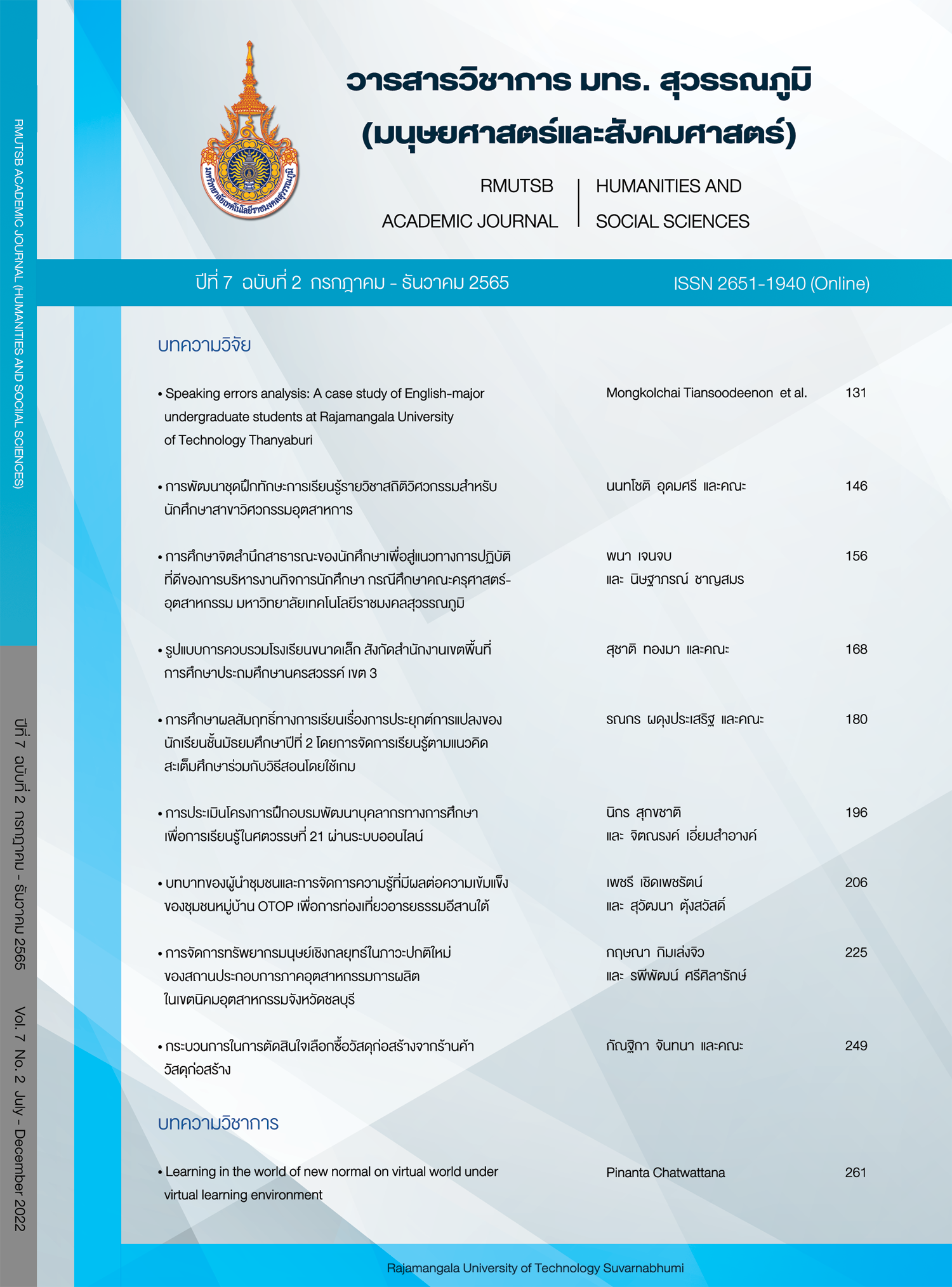A study of learning achievement on application of conversion of 8th grade students by learning management based on the STEM education together with game-based teaching methods
Main Article Content
Abstract
The objectives of this research were: 1) to study the learning achievement in the topic of application of conversion of 8th grade students after learning management based on STEM Education together with game-based teaching methods compared to the criteria of 70 percent; 2) to study the STEM skills of 8th grade students who received learning management based on STEM Education together with game-based teaching methods; and 3) to study their satisfaction with learning management based on STEM Education together with game-based teaching methods of conversion of 8th grade students. The sample group was Mathayomsuksa 2/4 students in Kasetsart University Laboratory School, Kamphaeng Saen Campus Center for Educational Research and Development, semester 2, Academic Year 2020, consisting of 35 students obtained by cluster random sampling. The instrument used for collecting data consisted of learning management plan, achievement test, STEM skills assessment form and the satisfaction questionnaire on learning management. Data were statistically analyzed by mean, standard deviation, and t-test. The research results were summarized as follows: 1) learning achievement on application of conversion of 8th grade students after learning management based on STEM Education together with game-based teaching methods was 70%higher than the criteria; 2) 8th grade students who received learning management based on STEM Education together with game-based teaching methods had STEM skills at a high level; and 3) the students in 8th grade were satisfied with learning management based on STEM Education together with game-based teaching methods at a high level.
Article Details

This work is licensed under a Creative Commons Attribution-NonCommercial-NoDerivatives 4.0 International License.
References
Chamrat, S. (2017). The definition of STEM and key features of STEM education learning activity. STOU Education Journal, 33(2), 13-34. (in Thai)
Chawanapaisarn, J., Varasunun, P., & Arunyanart, S. (2017). The development of mathematics achievement in Pythagorean Theorem by integrated STEM education of students in Mathayomsukasa 2 of Banglane Wittaya School. Veridian E-Journal, Silpakorn University, 10(1), 397-312. (in Thai)
Funfuengfu, V. (2017). Stem education and Thailand education. Journal of Humanities and Social Sciences Valaya Alongkorn, 7(2), 13-23. (in Thai)
Government Gazette. (1999). National education act B.E. 1999. Volume 116, Part 74, August 19, 1999.
Khunpinee, P., & Robroo, I. (2019). The development of learning actives via electronic games: C programming language subject for mathayomsuksa 4 students, Rajavinitbangkhen School. NRRU Community Research Journal, 13(1), 215-224. (in Thai)
Kruatong, S., & Leesuksam, N. (2020). The study of engineering design process skill using STEM education on electricity of grade 9 students. Journal of Education and Human Development Sciences, 4(1), 78-91. (in Thai)
Lohakarok, C. (2017). The results of mathematics learning management by using accompanying games affecting learning achievement and attitudes towards mathematics of grade 4 students. The 17th National research presentations Graduate Network Northern Rajabhat University (pp. 784-792). Phitsanulok: Pibulsongkram Rajabhat University. (in Thai)
Mahoney, M. P. (2010). Students' attitudes toward STEM: Development of an instrument for high school STEM-based programs. Journal of Technology Studies, 36(1), 24-34.
Ministry of Education. (2017). Basic education core curriculum B.E. 2008 Revised B.E. 2017. Bangkok: Office of Academics and educational standards, Office of the Basic Education Commission. (in Thai)
Pramot, P. (2018). Development of mathematical learning activity packages by using cooperative learning coupled with games to enhance learning outcome and desirable mathematical characteristics for Prathomsuksa 5 students (Master’ thesis). Chiang Mai University, Chiang Mai. (in Thai)
Prayadsup, P., Varasunun, P., & Oonwannadham, S. (2019). The Development of learning achievement in mathematics on Pythagorean Theorem by integrating STEM education of 8th graders of Kanchanapisekwitthayalai Suphanburi School. Journal of Education and Human Development Sciences, 3(1), 58-73. (in Thai)
Siripattrachai, P. (2013). STEM education and 21st century skills development. Retrieved 3 August 2020, from https://www.bu.ac.th/knowledgecenter/executive_journal/april_june_13/pdf/aw07.pdf. (in Thai)
Sribunruang, N. (2011). The effects of mathematics games for enhancing computation ability for prathomsuksa 1 students. (Master’s thesis). Buriram Rajabhat University, Buriram. (in Thai)
Tribunnithi, K. (2021). Development of training curriculum to enhance innovative thinking skills for industrial teacher students. RMUTSB Academic Journal (Humanities and Social Sciences), 6(2), 238-247. (in Thai)
Watchanakomkul, T. (2012). Teaching by using games to develop mathematics learning achievement on counting the number of primary school year 1 students (Master’s thesis). Songkhla Rajabhat University, Songkhla. (in Thai)


